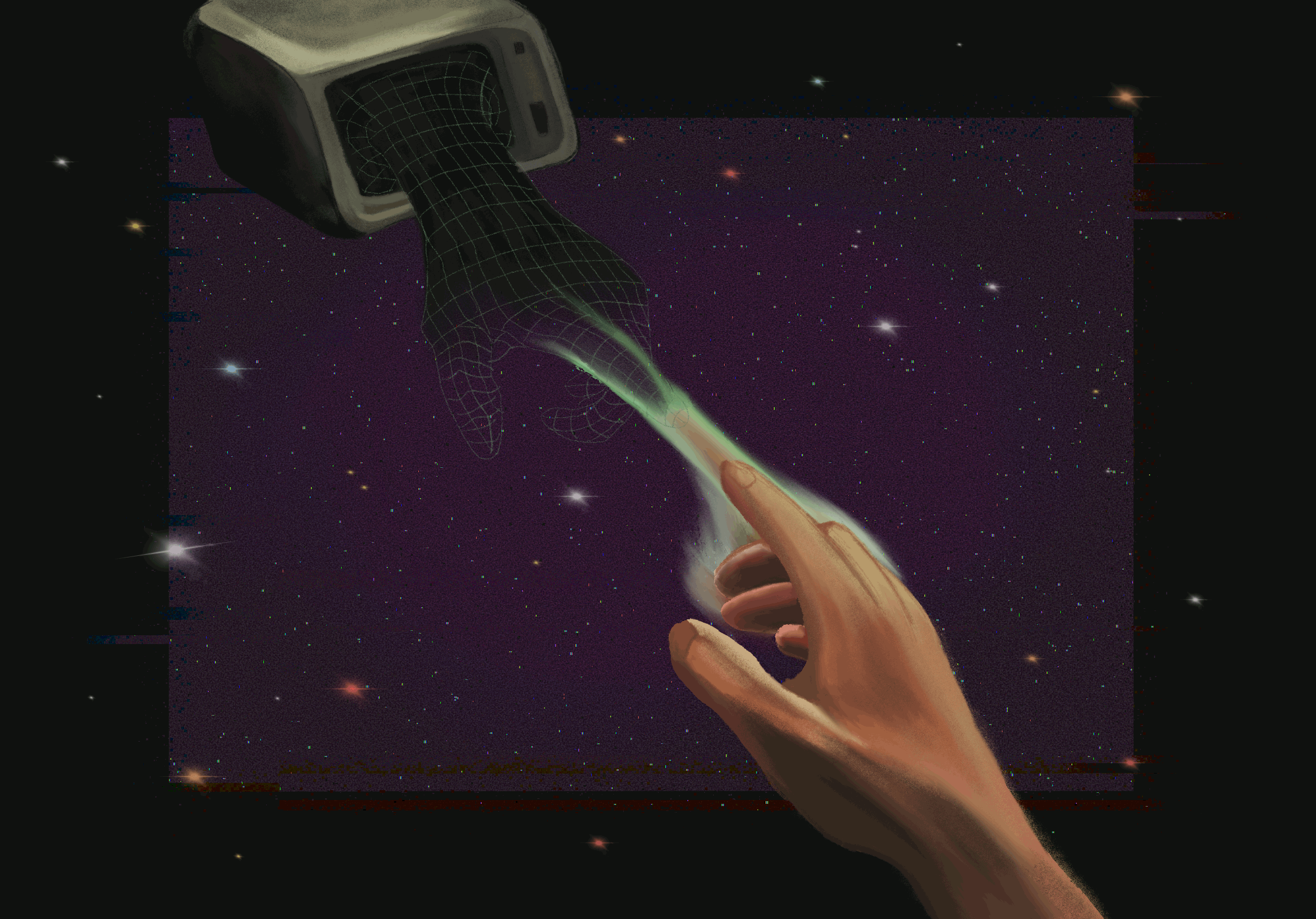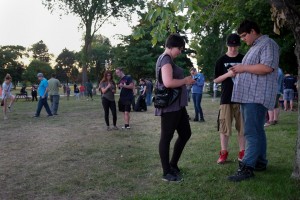“I will only accept being my own genre”: an interview with Porpentine
by Catherine Brewer | April 22, 2024

CYBERQUEEN starts with a black screen and just one word to click: ‘wet’. From there, things spiral. It starts off a simulacrum of any parser game you might imagine: sci-fi kitsch, ‘navigation chamber west’, a copious selection of guns whose capabilities are described in fetishistic detail. None of your choices here will matter. The narrative advances unrelentingly. You bear witness as the last remaining survivor dies. The thing, ship-mother, masochistic mistress of your game, could be looking right through your screen when she says: “Sorry to ruin your power fantasy.”
CYBERQUEEN was one of the first pieces of interactive fiction that Porpentine wrote. Their second work, HOWLING DOGS, won two XYZZY Awards, the IF Comp’s Golden Banana of Discord for most divisive entry, and was included in the 2017 Whitney Biennial. Porpentine’s work resists explanation. Alongside books, visual art, video games, and fucked-up installations, they write interactive fiction, a genre that used to be defined by crunchy parser games—where the player types in actions to advance, a cross between a choose-your-own-adventure book and a puzzle game—and now includes games defined by the irrelevance of choice. Porpentine makes plots out of Google Forms, stories where the players mark their own body with their choices, bleak randomized simulators where the player has no hope of winning. If there’s a common thread, it’s the medium: a narrative, usually branching, advanced by deliberate player choice. You click a link; you make a decision. Even with these choices, their games still feel claustrophobic, tight, trapped.
I came to Porpentine’s work from an uncomplicated world of novels and video games, a world in which my choices mattered, in which any agency I had was easy to endorse, where I wanted and wanted to want the objects of my desire. None of this is true of their writing. In With Those We Love Alive, you take hormones as routinely as sleeping, trapped inside a frightful palace to serve a monster of an empress. In CYBERQUEEN, you are rendered powerless before the ship-mother, and worse, forced to admit that you want this submission. In Porpentine’s creations, nothing you do can save you; you watch as you choose your own powerlessness, again and again.
Faced with choices that led me in circles, I decided to return to the source. I reached out to Porpentine and was able to talk to them about all the important things—porn, shit, bodies, dreams, punishment, and, of course, choices. You can see our conversation below.
Thanks for agreeing to this interview! I wanted to start by asking about how you approach agency and choice in your fiction. In some of your work you seemingly violate canonical rules of game design (‘give the player meaningful choices’), and in others you seem to deliberately provoke the player into acknowledging their choices don’t matter, or (I hope) the much harder and more interesting fact that, actually, their choices have mattered all along. How do you think about degrees of, and constraints on, player agency in gameplay? When do you offer a player a choice, a meaningless choice, or no choice at all?
When someone plays a game, it is out of the subconscious desire to be punished. They know they have been bad, and that only the machine in its mad, murky bias can deliver the pure retarded retribution of the angels.
People seem to find it therapeutic. Or cathartic. Like an enema. An enema is a deeply uncomfortable experience. But when the suffering is over, was it healthy for you? Not really. But the compulsion is telling…
Just like life, some choices matter, others don’t. My favourite dialogue options (Pathologic, Disco Elysium) reveal something about you in the question itself. Options as worldbuilding. But I’m most interested in dialogue that meshes with systems/resource management, so you’re forced to take responsibility—or dialogue that makes fun of you if you try to weasel through it. Disco Elysium and Pathologic are both very aware of the way people play games. Disco Elysium directly links a cautious, “neutral” playstyle to neoliberalism, and Pathologic is so anthropological that what you expect to happen, may not happen, because your cultural assumptions don’t map onto the steppe.
One thing I really love about your games is that they feel distinctly temporal, tied to a particular time and place and playthrough, rather than free-floating, on-demand experiences. Some of your work seems to ask the player to take time seriously, like the marking of the body in With Those We Love Alive or the rarer ending to Howling Dogs. How do you think about time and pacing in your work?
Time is soooo important. My favourite games rely on time. In Fear and Hunger or Pathologic, you need to eat, so you need to move. Food is a clock. Sleep is a clock. Other people are a clock. They can smell your masculine pussy from across the town square. Your ass is driving the dungeon crazy. It drives you forward in desperation, like an animal. Is there anything more beautiful than a guy rummaging through 100 trash cans so he can barter with children for a single egg which he will consume raw, in the shell, without emotion, so that he may earn the privilege of surviving to the next trash can?
Without time, you can’t lose. If you can’t lose, you can’t win.
You mentioned “free-floating on-demand experiences”…yeah…that’s a good description. And as I’m sure was your intent, the acronym spells FFODE, which looks a bit like food. But that’s not exactly how food is spelled. Something is a little fucked up. It’s a fucked-up food for people who have never been fed. Limbo live service.
There are times I insulated myself from time, but time was still being spent. You are always playing, whether you realize it or not.
I always think of time in my games/stories. It grounds you, even without a map. Like a pinch of salt, it turns a cup of tap water into the sea.
In my series Cunt Toward Enemy, every character has a watch, and that watch is their relationship to time, and their personality. A cheap plastic strap, your dad’s antique pocket watch, a stainless steel corporate timepiece, an athletic stopwatch, et cetera.
In my novel Serious Weakness, a lot of the story takes place at high-resolution, blow by blow, because when you’re a hostage, every second is meaningful. It’s a big book but people seem to read it pretty fast, because all the decisions matter. Like a roguelike, where a square is a unit of time and every move is a decision.
One theme that I notice is of estrangement and isolation, whether it’s living on the edges of an indifferent system or being physically or socially othered. In your work, you parallel mundane or familiar routines (e.g., taking hormones, sleeping, just trying to get by) with alien settings. How and why do you choose what elements of reality you want to keep vs. distort during gameplay?
I always start from the mundane. No matter the setting, everything returns to food and shit, the relentless needs that undermine the mask of adulthood. I’m endlessly interested in what a character decides to eat, and what they think about hiding from the world in a bathroom stall. Every fantastical element must link to a familiar one. The hard “soft penis” genre…
You mention defamiliarisation, which started with poetry, and you’ll notice many of my games transpire line by line, because prose suffocates: prose knows, as they say, and it is important to endure your own ignorance for a little while. You are not allowed to touch the dancers in a strip club.
If defamiliarisation is ‘a disturbance of, or delay in, the process of categorization’, I am the enemy of the category. My characters begin with a label so I can break them down. Everyone is trying to find their category, but it doesn’t have a concrete existence, so either you give yourself brain damage and get slotted in like a demographic bullet, or you recognize you’ve been betrayed by the institutions that need that category to fuel them. And that can drive people crazy. No one wants to be alone.
Sometimes people write me and say something I wrote rewired their brain and it’s so beautiful to hear, because when I was growing up everything was so ugly and it was only art that had this underlying fetishistic quality to it that made things beautiful for me. Porn is the process of developing your own way of feeling about something, beyond learned disgust. As your boy Shklovsky said: “Art exists that one may recover the sensation of life; it exists to make one feel things, to make the stone stony.”
Another theme that comes up in your work is embodiment. Interactive fiction (IF) is traditionally entirely abstracted from the body (maybe also abstracted away from the player?), but several of your games play with this boundary. How do you think about embodiment in cyberspace? How does cyberspace lend itself to boundaries between player-as-passive-character and player-as-active-agent, and do you feel that your games try to break these boundaries?
Games are a tool of punishment by a dark and sadistic god, and I am the instrument of that god.
You have this interesting position of being someone who makes weird games drawing from ‘lowbrow’ themes (trash, sex, dirt, waste) and fringe experiences in a niche medium, but who has also been recognised as a major artist by mainstream galleries and publications. How has becoming established as a writer reshaped your creative choices, as you potentially address wider audiences? Have your goals changed over time as your reach grows?
My work has only gotten more rancid.
I have much more control over my work. In the early days, many people tried to control what I did, and speak for me, and describe me in terms I despise. It takes time when you’re young to gain control over one’s life. The point of this is to make exactly what I want to make. It’s not like most artists can afford the cost of living even if they cut off pieces of themselves. Housing prices are genocide. I’m here to fuck my bug eggs into warm containers because I know my life is worthless and no one is coming to save me. I am a cockroach on a keyboard. I put my whole bug ass into what I make and when this insane, aching need makes other people feel something, that makes me so happy. What better legacy could anyone have than to screw up the clits, dicks, macroclitorides, etc., of random strangers and give them embarrassing fetishes for life?
I write for the tastes considered juvenile or embarrassing. Chuunicore. I want to make the world’s best hamburger, and I want it to give you the world’s best food poisoning, and it’s not a hamburger, it’s your arm.
Your work could (and has) gone in many different directions—as installation, graphic novel, traditional video game, prose, and IF. I’m curious about your choices of medium: what does IF allow or prohibit that other mediums don’t?
Games let you hide traps better.
They are also insane so it’s a good choice if you’re insane.
Or if you want to put a bunch of things inside a thing. Games are a super-container or super-medium.
Or if you want…to interact…with the fiction…
But ultimately, it’s just a tool for me to parasitise. Everyone knows me for something different. I make books and pictures and trinkets and it’s all part of this faggoty, insectile universe. Games are a compression of the explosion. I am not an ‘artist of X or Y’, I am an opportunistic infection. I will only accept being my own genre.
Are there works, references, or specific artists you find yourself returning to, either in your work or personally?
My dreams and porn are my biggest inspiration.
Shintaro Kago and Aeon Flux are two of my earliest influences. I come back to Thecatamites, Fear and Hunger, Disco Elysium, and Pathologic when I want to remember what a game can do. But the seed is different with each project. I get excited about an idea if I think no one else will touch it. Covered in piss…
Some of my stories are more like a movie script or play (The Pillow Man, Zoo Story, etc.). I’m interested in intense, unpleasant, claustrophobic power struggles between two closely matched adversaries, over and over in endless timelines in a nega-Zoroastrian dualism of a broken universe fighting to love itself through the weak pathetic bodies of mere humans, fighting for all time to overcome the bitterness, ugliness, and hatred blinding itself to the sweet and dreadful yearning, shattered in each other’s arms, their blood the only tears the gods are permitted to weep. Like I said, porn.
You’re now returning to IF after stepping away for 5 years. Do you have any projects you’re excited about releasing in the near future?
My upcoming games use the strange device known as “Picture” and I believe with some confidence that this will appeal to those with an interest, or should I say fundamental capacity to perceive colour, shape, and form, and it will be an admonishment to those who God has punished with myopia, etc…
Each game is a collaboration with a different artist, true masters of the ‘boy nightmare parasite continuum. There is more of a focus on characters because I want to create stronger effects.
My upcoming book is Torture Works, a collection of stories. There are some fucked-up little guys I’m excited to show people. I think they’re real bad. We could all benefit from viewing them in their enclosure. Because the torture audience is not served in today’s economy. They shit on the discerning chuuni. I shit IN. Thank you!!! ∎
Interview with Porpentine Charity Heartscape. Questions by Catherine Brewer. Art by Seraph Lee.




